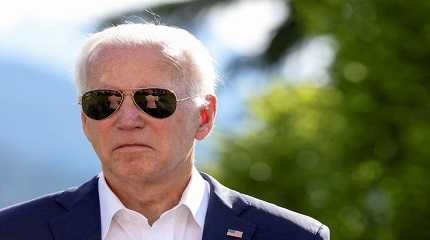
WASHINGTON, April 18 (Reuters) - U.S. President Joe Biden, facing congressional resistance to his proposals, will announce more than 50 executive actions on Tuesday aimed at advancing free preschool and expanding care for children, older Americans and those with disabilities.
Domestic Policy Council Director Susan Rice said Biden would continue to press lawmakers to approve $750 billion in funding for those areas over 10 years as outlined in his 2024 budget.
But in the meantime, he is directing federal agencies to adopt measures that do not involve new spending to increase Americans' access to high-quality childcare and long-term care, and to better support workers in those sectors.
"The president's not going to wait to take action to address our nation's care crisis," Rice told reporters. Biden will sign the order in the Rose Garden later Tuesday at an event with family caregivers, people with disabilities, older adults and early childhood and long-term care workers.
The White House is betting child- and elder-care programs, which are very popular with the public, can boost Biden's approval ratings as he nears an announcement of his candidacy for the 2024 presidential race.
Ai-jen Poo, president of the National Domestic Workers Alliance and Jenn Stowe, executive director of the National Domestic Workers Alliances, called the order "a major step toward modernizing" the U.S. care system.
"Care is a need that we can no longer overlook," they said in a joint statement. "As the care workforce crisis intensifies across the country and families continue to struggle to afford care, this set of executive actions marks the all-in commitment we need to make sure care jobs are good jobs and that Americans can access care for generations to come."
Biden is directing nearly every federal agency to identify grant programs that can pay for childcare and long-term care benefits for workers on federal projects, and to consider requiring companies applying for federal job-creation funds to expand access to care for their workers.
The Commerce Department pioneered this approach last month when it required companies seeking major funding under its $52 billion U.S. semiconductor manufacturing and research program to show how they will help workers access affordable childcare.
Other measures would improve access to home-based care for veterans, boost pay for early childhood educators, improve the quality of jobs caring for the elderly and those with disabilities, and promote the right of care workers to unionize.
Heather Boushey of the White House Council of Economic Advisers (CEA) told reporters that childcare and eldercare shortages and soaring costs limited the ability of many women to work, constraining labor supply and dampening economic growth.
She cited a recent Boston Consulting Group forecast that U.S. economic output could drop by $290 billion a year beginning in 2030 if critical care shortages and affordability were not addressed.
Senior administration officials declined to estimate the dollar value of Biden's actions and said the administration wants to implement the changes quickly.




